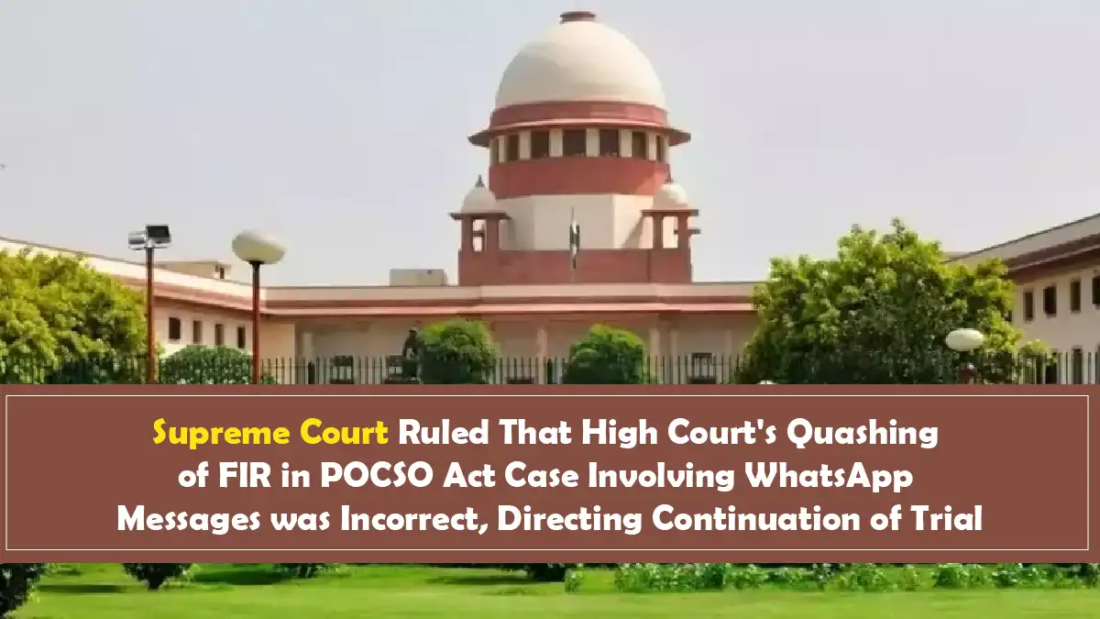Facts of the Case
The case involves allegations against respondent No. 1, a Computer Teacher at a school in Tirur, for inappropriate behaviour with female students. The victims, students at the school, reported incidents where the teacher allegedly held their hands while using the computer mouse and asked invasive questions about sanitary napkins. Additionally, he was accused of sending vulgar and obscene images to students via a WhatsApp group, though the students had actually given their parents’ contact numbers. Despite complaints being made, the teacher initially faced only a show-cause notice and an apology, but his behaviour allegedly continued. The police arrested respondent No. 1 after further complaints, but only the statement of a 19-year-old student was initially recorded. Eventually, five separate FIRs were filed, one of which was “settled” by respondent No. 1 with the victim. He then approached the High Court, seeking the quashing of the remaining FIRs. The High Court conducted a mini trial and held that “it is not possible to infer or impute that the said act has been done by the petitioner with any sexual intent.”
Contentions of the Parties
Contentions of the Petitioners (Appellants)
The appellants argued that the High Court erred in quashing the FIRs. They highlighted that the allegations, including inappropriate physical contact and sending vulgar WhatsApp images, prima facie constituted offences under the POCSO Act. The appellants contended that the relationship between the teacher and the victims—students—was one of authority, and the actions of the respondent should be interpreted with sexual intent, warranting trial.
Contentions of the Respondent (Respondent No. 1)
Respondent No. 1 contended that there was no sexual intent behind his actions and that the FIRs should be quashed. He argued that the allegations were exaggerated and that he had entered into a settlement with the 19-year-old victim. He further contended that his actions did not meet the legal criteria for the offences under the POCSO Act and IPC.
Court’s Observations
The Supreme Court observed that the High Court had erred in quashing the FIRs based on a “mini trial” and conclusions drawn from preliminary statements without giving the victims an opportunity to testify. The Court noted the serious nature of the allegations and emphasized the importance of allowing the trial to proceed. It highlighted that the POCSO Act’s Section 7, which defines “sexual assault,” could apply even if the physical contact did not involve penetration but was accompanied by sexual intent.
In particular, the Court pointed out that “The allegations that respondent No.1 would hold the hands of female students in the computer lab while using the mouse clearly falls within the ambit of ‘any other act with sexual intent which involves physical contact’.” Furthermore, the Court emphasized that the sending of “vulgar and obscene images on the WhatsApp group” was a serious issue. It stated that such actions were not merely harmless behaviour but could be construed as an attempt to exploit the students and thus warranted a trial.
The Court specifically addressed the role of the teacher in the case, asserting that “in the context of a teacher-student relationship, where the teacher is in a position of authority and trust, such physical contact, when accompanied by other inappropriate behaviour including asking invasive questions about sanitary napkins and sending vulgar images, provides sufficient basis to infer sexual intent for the purpose of proceeding with trial.”
Court’s Order
The Supreme Court set aside the High Court’s judgment, holding that the trial should proceed. It directed that the trial court, which had already received the chargesheets, should continue with the trial and complete the framing of charges within two weeks. The Court also ordered that:
- The trial court should take up the matter at least twice a month and record the statements of all victims.
- The victims must be treated as protected witnesses, and measures should be taken to prevent any contact or influence by the respondent on the victims.
- Respondent No. 1 was to be kept under suspension by the management of the M.M.M. Higher Secondary School, Koottayi, until the conclusion of the trial. The school was also allowed to hold a domestic enquiry against him independent of the criminal trial.
In conclusion, the Supreme Court allowed the appeals and ordered that the investigation and trial should proceed without further delay.
Credits: Adv. Deeksha Rai
 Cart is empty
Cart is empty 

